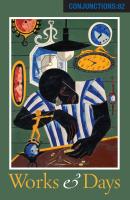![Photograph © Pawul Kruk Photograph © Pawul Kruk [A Reading by Peter Orner]](http://www.conjunctions.com/images/event_image.php?id=136226) On Monday, October 28, at 6:30 p.m., in the László Z. Bitó ’60 Auditorium, Reem-Kayden Center (RKC), Peter Orner reads from his new collection, Maggie Brown & Others. Presented by the Innovative Contemporary Fiction Reading Series and the Written Arts Program, and introduced by MacArthur Fellow Dinaw Mengestu, the reading is free and open to the public; no tickets or reservations are required. Books by Peter Orner will be available for sale, courtesy of Oblong Books & Music.
On Monday, October 28, at 6:30 p.m., in the László Z. Bitó ’60 Auditorium, Reem-Kayden Center (RKC), Peter Orner reads from his new collection, Maggie Brown & Others. Presented by the Innovative Contemporary Fiction Reading Series and the Written Arts Program, and introduced by MacArthur Fellow Dinaw Mengestu, the reading is free and open to the public; no tickets or reservations are required. Books by Peter Orner will be available for sale, courtesy of Oblong Books & Music.An essential voice in American fiction, Peter Orner is the author of acclaimed books such as The Second Coming of Mavala Shikongo (2006), winner of the Bard Fiction Prize; Last Car Over the Sagamore Bridge (2013); and the National Book Critics Circle Award finalist Am I Alone Here? (2016), a memoir. Best known for his short fiction, Orner has been hailed as “a master of his form,” a writer who “doesn’t simply bring his characters to life, he gives them souls” (New York Times). Now, in his sixth book, Maggie Brown & Others (2019), Orner gathers a novella and forty-four stories—many as short as a few paragraphs, none longer than twenty pages—into an orchestral, polyphonic collection, his most sustained achievement yet.
Peter Orner is the author of two novels, three story collections, and a memoir. His stories have been anthologized in Best American Short Stories and twice received a Pushcart Prize. Orner has been awarded the Rome Prize from the American Academy of Arts and Letters and the American Academy in Rome, a Guggenheim Fellowship, a two-year Lannan Foundation Literary Fellowship, as well as a Fulbright to Namibia. Currently, he is a Professor of English and Creative Writing at Dartmouth College and lives with his family in Norwich, Vermont.
PRAISE FOR PETER ORNER
“It’s been apparent since his first book, Esther Stories (2001), that Peter Orner was a major talent . . . You know from the second you pick him up that he’s the real deal. His sentences are lit from below, like a swimming pool, with a kind of resonant yearning that’s impossible to fake . . . Orner can do anything.” —New York Times
“Mr. Orner packs remarkable pathos into his condensed dramas.” ―Wall Street Journal
“Orner writes with a combination of sincerity and self-awareness. . . . Most vividly reminiscent of Raymond Carver.” ―San Francisco Chronicle
“Orner is incapable of dishonoring his characters. He treats all of them—even the minor figures—with a fierce humanity.” —Boston Globe
“Peter Orner is that rare find: a young writer who can inhabit any character, traverse any landscape, and yet never stray from the sound of the human heart.” —Washington Post
“[Orner] is one of our most empathetic writers today. . . His fiction has an intimate feel: we are in conversation with otherwise unknown and forgotten lives. This is what makes Orner’s characters live and breathe beyond the page . . . This is how his clean, simple sentences succeed far beyond the limited space he gives them . . . Let us be thankful for Peter Orner.” ―Los Angeles Review of Books
“Orner is secretly one of the best contemporary writers working today: his characters are indelible, his focus small and piercing, his insights moving . . . all with his special sense for truth, character, and wistful realism.” ―Literary Hub
